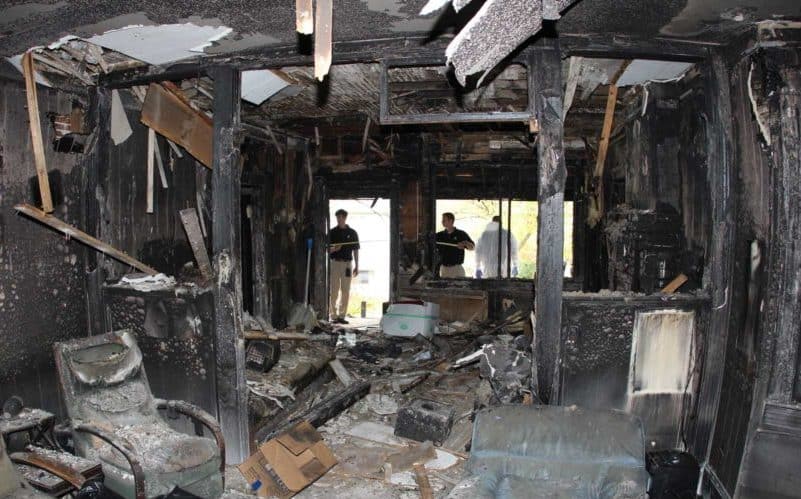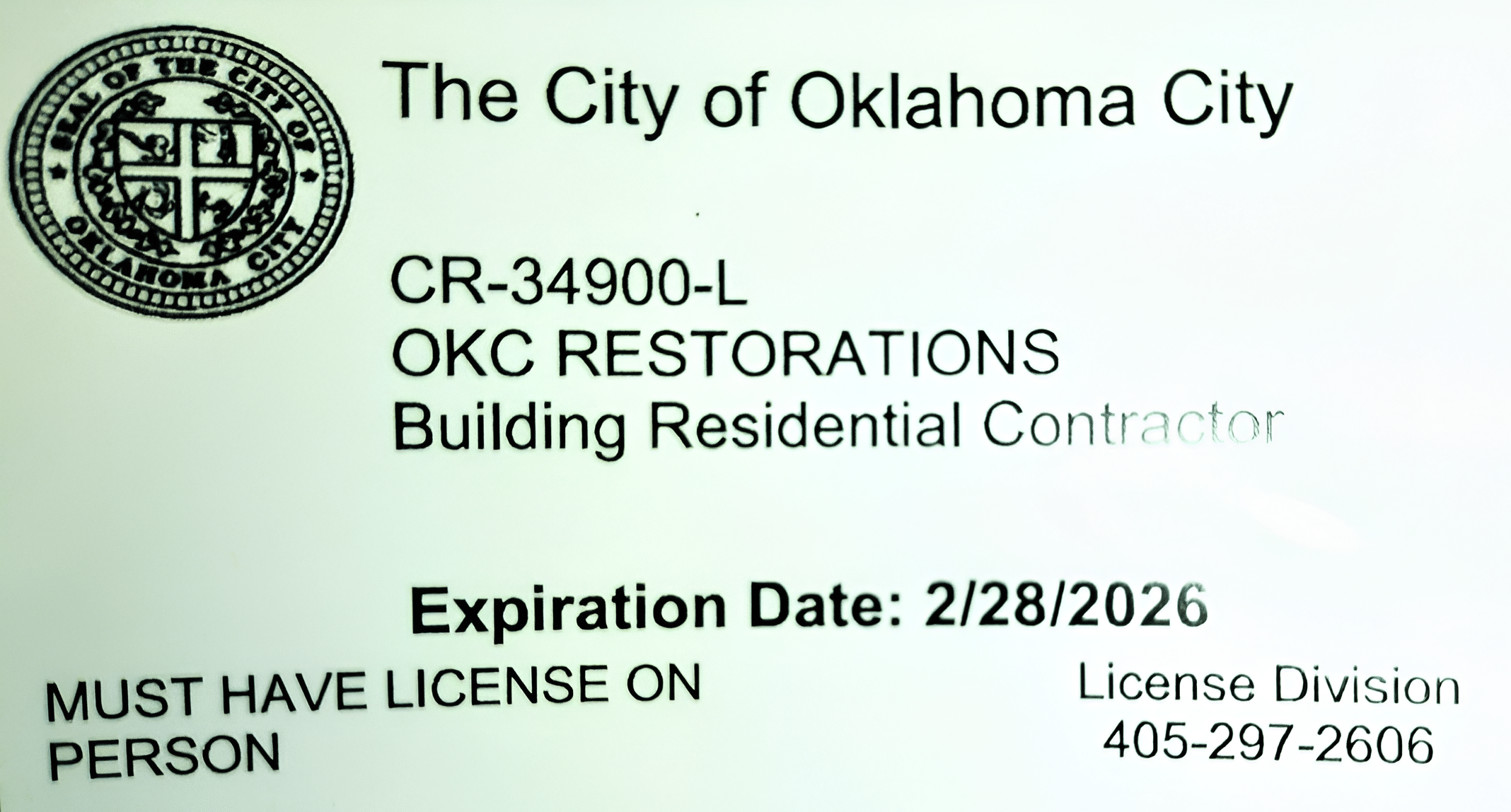
There’s no easy way to prepare for a house fire, and even less clarity in the hours that follow. The damage goes beyond physical damage to your home, since fire disrupts routines, displaces families, and throws people into a whirlwind of decisions they didn’t expect to make. Between safety concerns, cleanup, insurance, and finding a place to stay, it’s hard to know what to do after a house fire. This guide breaks down what matters most after a fire, so you can take action without getting overwhelmed.
Ensure Safety After a House Fire
The hours right after a fire can feel unreal. Your home could be unsafe, the air could be filled with toxins, and not all the danger is visible. Start by staying out of the property, calling the right people, and putting your family’s well-being first. The priority in this unfortunate situation is safety, not cleanup.
Do Not Re-Enter the Property
No matter how badly you want to go back inside to check on your things, resist the urge. Fires can weaken floors, ceilings, and walls in ways you can’t see right away. There could be live wires, broken gas lines, or smoldering areas that haven’t been fully extinguished. Stepping into an unstable home could make things worse. Always wait until firefighters or restoration experts tell you it’s safe to enter.
Contact Emergency Services
Even when the fire looks controlled or like it’s out, your job isn’t over. You still need to notify local emergency services. Call the fire department to confirm whether a report has been filed or will be filed. That document is very important. It’s what insurance adjusters, contractors, and cleanup crews will rely on. Firefighters may also shut off utilities, check for hidden hotspots, or identify gas leaks that aren’t immediately obvious. Let them walk you through what’s next before you take any further steps.
Ensure Family and Pet Safety
After leaving the house, check in with everyone who was inside, including children and pets. Some symptoms of smoke exposure or shock don’t appear immediately. Look for signs like coughing, fatigue, or anxious behavior. Even if nobody seems hurt, the stress of escaping a fire can take a toll. Health and safety should always come first after a house fire, no matter how urgent the rest of your to-do list feels.
Seek Medical Attention
After a fire, health should be your next focus. Breathing in smoke or chemicals can affect your lungs, even if you were exposed for only a short time. People with asthma, the elderly, or anyone with existing health issues are especially at risk. Get checked out as soon as possible and save any medical records in case they’re needed later. Don’t skip this step, as it’s better to be cautious than to miss a delayed reaction.
Address Water Damage Promptly
What many homeowners don’t realize is how much water a fire leaves behind. Between burst pipes, sprinklers, and fire hoses, your space could be saturated. Knowing how to clean after a fire means starting with moisture removal before mold sets in or structural materials begin to break down. Ideally, drying should begin within the first 24 to 48 hours. Professional crews can speed up the process using dehumidifiers, fans, and moisture-extraction tools.
Deal With the Immediate Aftermath
After the fire is contained and your family is safe, you’ll need to act quickly to protect your home and begin recovery. That includes where to sleep, how to protect your damaged home, and what to prioritize first. In the early stages, the goal is to stabilize the situation and avoid actions that could delay cleanup or repairs, and hold off on any major moves that could affect your insurance coverage or repair timeline.
Secure the Property
Even if the fire department has cleared the scene, your home could still be vulnerable. Broken windows, damaged doors, or collapsed walls leave your property exposed to weather, animals, and trespassers. Board up any open entry points with plywood or have a professional do it if you’re unsure how. If the utilities haven’t already been shut off, make sure gas, electricity, and water are turned off to prevent further hazards. Repairing a house after a fire starts with preventing more damage from happening while you’re figuring out your next steps.
Temporary Housing and Relocation
If the fire left your home severely damaged, going back right away might not be an option. Finding temporary housing becomes the next step. That could mean staying with relatives, booking a hotel, or contacting local organizations that help with emergency shelter. Save every receipt, including those for meals, fuel, and lodging, since your insurance may cover those costs. Having a safe place to stay gives you room to breathe and figure out your next move.
Assess the Damage
Fire damage isn’t always obvious. You might spot scorched walls or broken windows, but smoke and water often reach deeper. Moisture can seep beneath floorboards. Smoke residue can settle inside the vents. Even items that look untouched may not be safe. Go room by room, take notes, and photograph everything. A slow, detailed walkthrough now helps avoid costly surprises later.
Visual Inspection and Documentation
Start with a complete walkthrough of your property. Instead of doing it alone, bring someone who can help you spot what you might overlook and assist with taking photos or videos. Move from room to room and take your time. Look closely at the walls, ceilings, floors, appliances, electrical wiring, and plumbing. Note down the condition of each space and list items that were damaged.
Understanding Damage and Restoration Approaches
Some fire damage is easy to miss. What looks like a small burn might mean deeper issues inside the walls. Experts usually group fire damage into four types: burned materials, water damage, smoke stains, and odor. Each one needs a different fix. Some areas may need to be torn out. Others need drying or deodorizing. If you’re not trained, don’t try to repair it on your own.
Salvage Important Items
Before you bring professionals in to clean up, check for anything worth keeping, such as important documents (driver’s licenses, insurance policies, passports, medical records, birth certificates, marriage certificates, title and deeds), valuables, electronics, or items with personal value. Hold off on tossing anything until a restoration professional has reviewed it. For anything you do discard, make sure to take photos, write a short description, and keep a record for your insurance claim.
Removing Smoke Odors and Soot
Smoke doesn’t just leave a smell once the fire is out; it settles into walls, ceilings, furniture, and vents. If it is not removed properly, the odor can stay for months. Soot can ruin a home if it’s not cleaned quickly. It corrodes metal, stains walls, and eats away at materials. Getting rid of smoke and soot takes more than a quick wipe-down. Crews bring in HEPA vacuums, ozone machines, and other tools to do the job right. Skipping this step can lead to more damage and make it harder to live in a space again.
Deep Cleaning and Deodorization
Smoke and soot stick to walls, furniture, and air vents. Cleaning teams usually start by vacuuming and wiping surfaces to remove the soot. To deal with the smell, they might use ozone machines or foggers. Curtains, rugs, and other soft materials often absorb the most smoke and may need to be deep cleaned or tossed. If the air ducts are not cleaned, that smoky odor can keep coming back.
Contact Professionals For Recovery
Once everything is documented, it is time to bring in a licensed fire restoration team. They can check for hidden damage, handle repairs safely, and determine the next steps. Trained crews have the tools and experience to deal with the effects of a fire properly. Trying to fix things alone can be risky and may slow down the process.
Hire a Fire Damage Restoration Company
Not every contractor knows how to deal with fire damage. Look for one with proper certification and experience in smoke and structural cleanup. The right team will inspect your home, explain what needs to be done, and handle everything from debris removal to major repairs. A trusted fire restoration company can make the process easier and help you avoid mistakes that could delay recovery.
Contact Your Insurance Company
Dealing with insurance can be one of the most frustrating things after a house fire. Timing, documentation, and communication matter. The sooner you reach out to your provider, the sooner the recovery process can move forward. From starting a claim to understanding your policy limits, this part of the process requires focus and patience.
Initiate the Claim Process
Call your insurance company as soon as possible. Be prepared to give them a detailed account of the incident, including the time, cause (if known), and the level of visible damage. Ask what forms to complete, and when an adjuster will visit. Keep a record of every conversation and receipt, as this paper trail will matter later.
Document the Damage
Photograph each item and attach receipts or records if you have them. List everything that was damaged, room by room. Claims go faster when the details are clear and backed up. A rushed list can cost you later.
Understand the Coverage
Review your policy. Some plans only cover the structural damage, while others include contents, housing, and cleanup. Don’t assume something is covered; read the fine print thoroughly. Ask questions if anything is unclear, and consider hiring a public adjuster if needed.
Emotional and Psychological Recovery
After such a disastrous event, it takes time for everything to feel normal again. The emotional stress may not appear immediately, but can surface days or even weeks later. Even when the cleanup is complete, the disruption to daily life can linger. Talking to someone or getting support can help ease that transition back to stability.
Support Children and Pets
Children and animals may have difficulty adapting after a fire. Stick to regular routines wherever possible. Explain things simply to kids and provide comfort items to pets. Reducing their stress helps reduce yours.
Rebuilding and Moving Forward
This phase is where you begin putting things back together, starting with your home, your routines, and your sense of control. Focus on steady progress. You don’t have to fix everything at once.
Work with Contractors for Rebuilding
Hire licensed contractors who have handled fire damage before. Ask for references and written estimates. Always read the contract before signing. Make sure that the timeline, costs, and scope of work are clearly written down.
Replace Lost Documents
Start with IDs, property titles, and insurance papers. These are often needed for other tasks. Contact the issuing offices directly. Many offer faster processing if your documents were lost in a disaster.
Install Smoke Detectors
Put smoke alarms in every bedroom, hallway, and main room. Check if they work once a month. Change the batteries once a year.
Adequate Insurance Coverage
After repairs, go over your insurance again. Make sure it pays for the full cost to rebuild, not just what your house was worth before. See if it also helps with things like staying somewhere else or replacing lost items. It’s best to sort these things out now instead of finding out too late.
Fire Safety Practices
Make sure everyone in your home knows what to do if there’s a fire. Plan a way out and practice it. Keep fire extinguishers in the kitchen and any risky spots. Unplug things when you’re not using them.
Air Purification
Smoke can stick around in air ducts and walls. Use air purifiers with HEPA filters. Clean or replace HVAC filters and vents. Breathing clean air keeps your home more comfortable.
Legal and Financial Considerations
A fire brings legal and financial stress, too. Being prepared helps you avoid more problems down the road.
Understanding Liability and Legal Rights
If the fire was caused by a product defect or someone else’s actions, legal options might be available. Keep anything that shows what happened, such as photos or written reports.
Managing Financial Recovery
Keep track of everything you spend, including hotel stays, cleanup costs, and meals. Keep receipts and organize your paperwork. If you’re struggling, ask for help from disaster relief programs, charities, or local agencies. You can also talk to your mortgage provider to ask about payment options while you recover.
Key Takeaways
Recovering from a house fire takes time and can feel overwhelming. First, make sure everyone is safe. Then, try to secure the home and contact your insurance company. Keep track of what you spend and talk to people who can help with cleanup or repairs. If it feels like too much, ask for help. In Oklahoma City, OKC Restorations can guide you from cleanup to rebuilding. Reach out when you need support.




